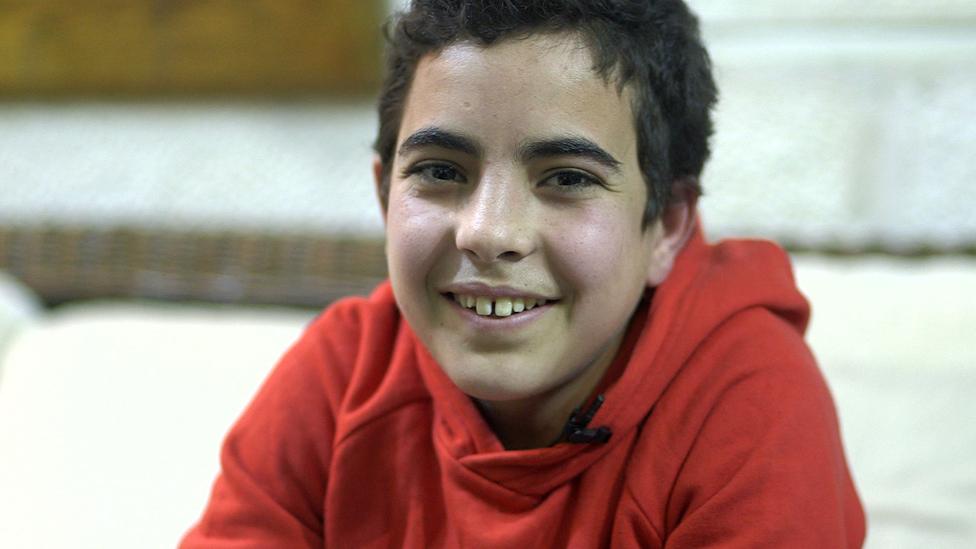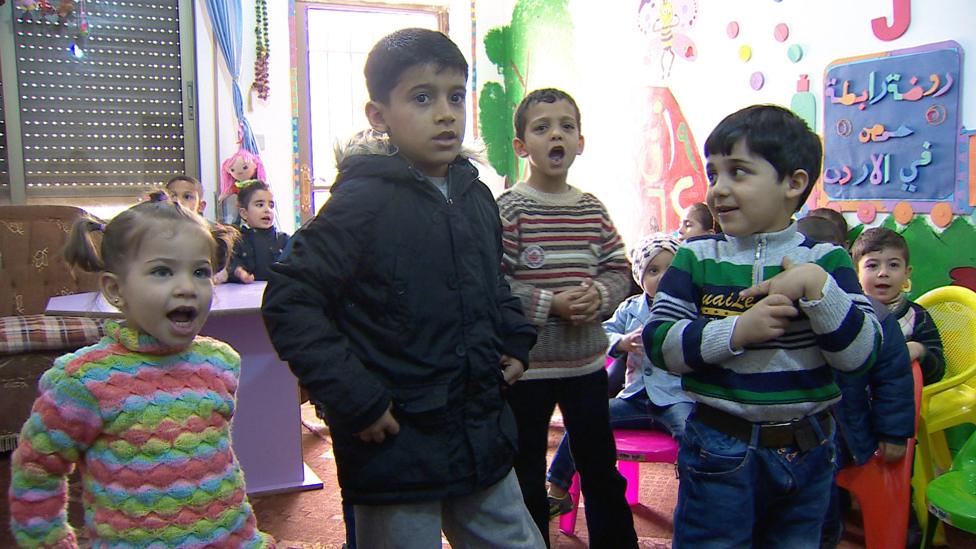The children who just want to go home
- Published

The war in Syria has forced more than half of the population to flee their homes and has created a generation of children with physical and psychological scars. Despite the trauma, some of these young people are still able to inspire those around them, writes Caroline Hawley.
He has all the makings of a future film star. Good looks, a wide, winning smile. And bags of charm. Ibrahim, who is 12, lives in a non-descript building that doubles as a rehabilitation centre for injured Syrians in the suburbs of the Jordanian capital, Amman.
He's been out rehearsing for a play and glides in to meet me, moving effortlessly on his crutches. A friendly hand stretches out to greet me and he flashes that smile.
He asks me if I'm brave enough to see his mangled leg - he nearly lost it in an airstrike that killed his mother, two sisters, three brothers, as well as his uncle and five of his cousins. He lists his dead relatives in such a matter-of-fact way, as if it's utterly normal to lose half of your family.
Ibrahim has just been given asylum, with his father, in Canada. He's due to leave in the next few days. "Great. You must be looking forward to it," I say.
"Not at all," he replies quickly. "It's too far away. Far too far." Ibrahim wants to go back to Syria as soon as he can. And he wants to be a war reporter. "The outside world doesn't know the half of what's going on there," he says.
Rouaa wants to return to Syria to find her doll
Thousands of Syrian families are on the move in Europe, trying to escape from unimaginable horrors. But the children I meet in Jordan and in Lebanon almost unanimously just want to go home.
Rouaa, a delicate-featured friendly five-year-old, says she'd go back to Syria tomorrow if she could. She wants to find the doll she hid in a drawer as the family fled after the chemical attack on her neighbourhood in 2013.
Rouaa's little brother - four months old at the time - was briefly in hospital. Their home now is a bleak, weather-worn camp on Mount Lebanon - her parents and five children in one small tent. Rouaa says she misses being able to cook their own food and share it.
In Jordan I'm introduced to a young boy who lost both legs, an eye and one of his hands in a landmine explosion. A word of warning - if you ever meet him, don't take him on at table football. He's ferocious. The grey plastic chair he's on rocks back and forth with the energy he's putting into his shots.
When I ask what he would change, if he could, about the past five years, he says simply that he wants to look forwards not backwards.
The following day he had prosthetic legs fitted. On his own in hospital - with no family members there to witness it - he took his first steps since the summer of 2014. He told the hospital staff helping him that he wanted to walk right out of the hospital. And he did, with huge determination. Step after hesitant step, he walked and he walked and he walked.
Mustafa has made an inspiring recovering after being seriously injured by a barrel bomb which killed both his parents
I meet another little boy, Mustafa, who also had to learn to walk again after a barrel bomb hit his family house on the outskirts of Aleppo. Both of his parents were killed and he spent a year in hospital.
He still needs a hip replacement. The hospital run by Medecins Sans Frontieres in Amman - which carries out reconstructive surgery on war victims - isn't at the moment equipped to do that. He's still partially paralysed because of shrapnel that can't be removed from his brain.
But at the tender age of five, Mustafa has already been an inspiration to others. When he arrived at the hospital, he couldn't stand, he was malnourished and so traumatised he couldn't eat. He'd scream whenever he saw anyone in a white coat. He left on his own two feet, a different boy.
And he left a big hole at the hospital. All the staff and many of the patients had fallen in love with him - his big brown eyes, his smile, his determination. I must admit that I did too.

Mustafa, on the right in a stripy top, with his classmates
I watch him in a nursery class, taking part in every activity and singing every song, showing a younger girl the moves. And he doesn't flinch - he even takes part - when the children sing a song about their mothers.
Imagine Mustafa's strength of character. Imagine too the psychological damage Syria's war has done to its children.
I came back home after five days away - the longest I've ever spent apart from my own two-year-old. I lay down beside him that night as he slept and held his hand. He has two hands. He is physically whole. We were warm and safe, and we were all together.
After five years of war, how many Syrian families have that?
How to listen to From Our Own Correspondent, external:
BBC Radio 4: Thursdays at 11:00 GMT and Saturdays at 11:30 GMT
Listen online or download the podcast.
BBC World Service: At weekends - see World Service programme schedule or listen online.
Subscribe to the BBC News Magazine's email newsletter to get articles sent to your inbox.